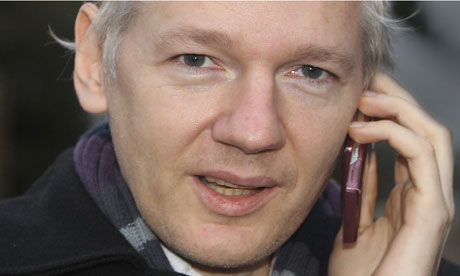Julian Assange defends decision not to face questioning in Sweden
WikiLeaks founder says he is not obliged to return to be questioned over sexual assault allegations

Julian Assange today defended his decision not to return to Sweden for questioning over allegations of sexual assault, saying he did not need to be "at the beck and call of people making allegations".
The WikiLeaks founder said he was not obliged to return to the country, adding that there were "serious problems" with the prosecution against him.
In a separate interview with the Times, Assange claimed documents had been leaked to the Guardian by the Swedish authorities in an attempt to "undermine" his bail application hearing last week.
Speaking from the mansion in East Anglia where he is staying under the terms of his bail, he told BBC Radio 4's Today programme: "I don't need to go back to Sweden. The law says I also have certain rights, and these rights mean that I do not need to speak to random prosecutors around the world who simply want to have a chat, and won't do it in any other standard way."
Assange said he had waited in Sweden for five weeks to be interviewed by police – "so I can put my side of the case forward" – but the interview did not happen.
He added that he had been told there was no reason for him to remain in the country.
In a separate interview with the Times, Assange said documents had been leaked to the Guardian by the Swedish authorities in an attempt to "undermine" his bail application hearing last week. However, the documents were not leaked to the Guardian by Swedish authorities, and details from the documents to which Assange referred were only published after the 16 December hearing.
Asked by the BBC's John Humphrys why he would not return to Sweden to deal with the allegations, Assange said: "If they want to charge me, they can charge me. They have decided not to charge me."
He added: "They have asked, as part of their application, that if I go to Sweden and am arrested, I am to be held incommunicado.
"They have asked that my Swedish lawyer be gagged from talking to the public."
Asked by Humphrys: "Are you a sexual predator?" Assange said it was a "ridiculous" suggestion, adding: "Of course not".
He was then asked how many women he had slept with. He refused to answer, saying: "A gentleman doesn't count."
Discussing the effect WikiLeaks had brought through its publications, Assange said the organisation had "changed governance – we have certainly changed many political figures within governments".
Assange was granted bail on 14 December, but remained in jail for a further two days after the Swedish authorities challenged the decision.
The Times reportedthat Assange was unhappy with the Guardian for "selectively publishing" sections of the documents.
The Guardian was allowed access to documents relating to the case – including interviews with some of the central characters – but none of these were in fact leaked for such a purpose.It is understood Assange's defence team had seen copies of everything seen by the Guardian. Assange's final bail hearing was on Thursday 16 December.
The Guardian published an article which included some details from the police statementsonline at 9.30pm on Friday 17 December, and in the Guardian newspaper on Saturday 18 December.
• This article was amended on 23 December 2010. A quote in the original referred to "changed governments". This was taken from a transcript on the BBC website which has subsequently been revised.

No comments:
Post a Comment